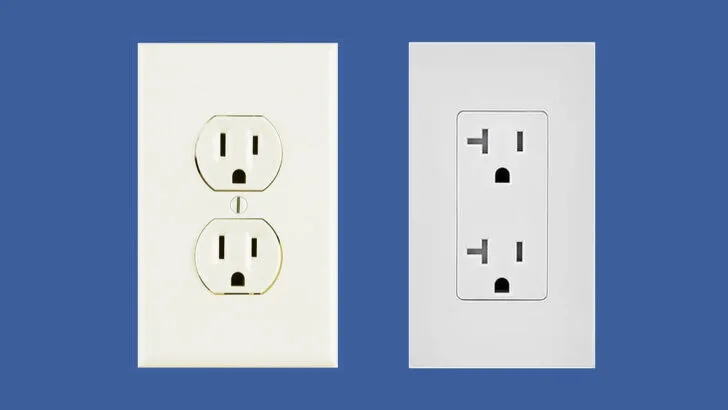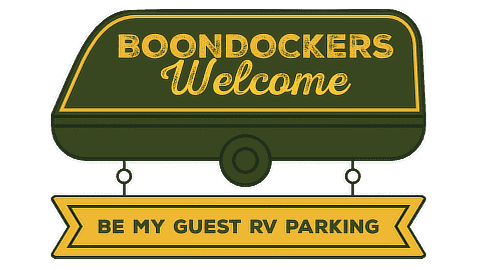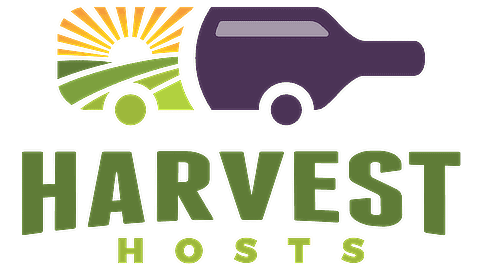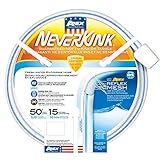RVing isn’t limited to traditional campgrounds and RV parks. We’ve often covered the joys of boondocking (camping off the grid – usually free) because it’s our favorite way to camp. In our post Can You Camp In Walmart Parking Lots? we talked about parking overnight to get some shut-eye when you’re in the middle of a long drive. But what about “Moochdocking?”
We’ve written about free overnight RV parking in a variety of areas, as well as the 7 best free camping apps for the avid boondocker. But there’s another type of camping known as RV moochdocking, (sometimes called RV driveway surfing), that’s become a popular trend.
In today’s post, we’re looking at moochdocking… a type of RV camping that’s great for both RVers and their hosts.
What Is Moochdocking?
Moochdocking is a coined term that combines “mooch” (someone who happily takes things for free) and “boondocking.” But what’s the exact moochdocking definition? Does it have the same negative meaning as being a “mooch?” (Spoiler alert: it doesn’t.)
Moochdocking involves parking your RV on private property, usually in a driveway, backyard, or other open space. Most often, it’s when an RVer is invited, typically by a friend or family member, to stay on their property while visiting. Of course, that friend or family member has to have a large enough space for your rig.
Moochdocking can be for just a night or two while the RVer is en route to a particular destination, or it can involve a longer-term stay such as over the holidays or even for many weeks. There are benefits to moochdocking for the RVer and often for the host as well.
As the name implies, moochdocking is free. Considering the cost of most RV parks, camping for free is a big plus.
Moochdocking often comes about when planning to visit a friend or family member. But since RVers bring their own living quarters, the host doesn’t have to provide a place to stay inside the house. That can benefit to both parties, with everyone having their own private space.
For longer stays or when the RV is connected to the homeowner’s shore power and/or water supply, offering to pay for using these amenities makes sense. But that’s still a small cost compared to a campground or RV park.
Also, when you stay on someone’s property they can offer insight into the area’s best-kept secrets, from hidden gems to local restaurants and attractions. That can help an RVer travel more like a local, with inside information they might not have without that personal guidance.

A hidden benefit of moochdocking is getting tips on hidden gems from your host, who lives right in the area.
For property owners who offer a place to park & stay for RVers who aren’t family or friends (like those in the Boondockers Welcome and Harvest Hosts programs), there are benefits for them, too. That includes meeting new people, connecting with the RV community, and potentially forging lifelong friendships.
Some homeowners also like having other people on their property, either because they appreciate the company and added security, or possibly having someone they can ask for some help with a chore or project.
Safe, free and legal RV parking on private property. It’s like having friends and family everywhere! A great alternative to being stacked side-by-side in an RV park.
<a...Show More
Safe, free and legal RV parking on private property. It’s like having friends and family everywhere! A great alternative to being stacked side-by-side in an RV park.
Watch our Boondockers Welcome video
Boondockers Welcome in Australia
Read Our RV Trip Planner Post
Save 15% on your initial membership with coupon code.
Show LessTired of RV Parks and Campgrounds and want to try something different? Stay overnight at wineries, breweries & distilleries, farms, and other attractions instead! Enjoy unique experiences that...Show More
Tired of RV Parks and Campgrounds and want to try something different? Stay overnight at wineries, breweries & distilleries, farms, and other attractions instead! Enjoy unique experiences that you'll always remember.
Save 15% on your first year’s membership to Harvest Hosts... click on the "Go To The Deal" button!
Show LessTips for the Best Moochdocking Experience
To ensure a successful moochdocking experience, both RVers and homeowners should keep a few key points in mind.
Safety and Security
Safety and security should be priorities for both RVers and hosts. Guests (RVers or not) should be careful, thoughtful, and respectful. Homeowners who offer a boondocking experience on their property should ensure the safety of their property and visitors.
Unlike typical houseguests (who of course stay in the house), RV moochdockers are likely to stay on board their own rig. That can add an extra set of eyes and ears outside the host’s home at night, providing added security. That can also mean added security for the RV itself, since it may attract attention being parked in a driveway or backyard.
Good Communication
Clear communication between the RVer and the host ahead of the visit is key. RVers should contact the homeowner in advance to discuss expectations and agree on the duration of the stay and any amenities that will be provided.
That should include a discussion about what compensation will be provided for power usage (if any). Homeowners need to be upfront about any rules or guidelines they have for RV living on their property and any expectations they have of travelers. That’s extra important if kids and/or pets are involved.
Of course, communication when visiting family and friends in an RV will be similar to visiting without one, other than the logistics of where to park and possibly hook up.
Respect for the Property and the Owner
Even when visiting people you’re close with, RVers should always respect a host’s property. Be mindful of noise (generators, pets, kids, etc.), don’t leave trash or any other type of mess on the property, and follow all rules set by the homeowner. The best way to moochdock is to treat the property as if it were your own, or even better.
PRO TIP: Heavy weight can cause concrete to crack, or jacks to sink into asphalt. A big diesel pusher can easily break a concrete driveway, and the jacks on almost any rig can damage asphalt on a hot summer day. Keep these things in mind when planning to bring your rig to a private home, that may or may not be well set up to accommodate an RV.
Moochdocking Allows Self-Sufficiency. Use it!
RVers should aim to be as self-sufficient as possible during their moochdocking stay. Some homeowners offer access to utilities like water and/or electricity, but it’s important to be prepared to manage without them.
You may also be invited to stay in your host’s guest room. One of our favorite things about RVing is staying in our own bed, wherever we go. That doesn’t mean we can’t use a guest bedroom, but we prefer our own. And staying over without creating any extra linens for our host is a bonus!
If you’re staying on private property without access to power and you need to use a generator, clear it with your host first. Never use a generator too close to a building, where exhaust fumes might enter the house. And you don’t want to create a noisy environment that’s disruptive to the homeowner’s peace and quiet.
PRO TIP: Most electric outlets in the average home are rated at 15A. But outlets in the garage are often rated at 20A. (20A outlets are protected by 20A circuit breakers, so plugging into one will reduce the chance of tripping the breaker.) The fact that the garage is where you’ll often find a 20A outlet is perfect if you’re parked in the driveway.

This image shows how to tell the difference between a 15A outlet (on the left) and a 20A outlet (on the right). That little horizontal “T” shape for the left prong of the plug means that you’re less likely to trip the breaker.
If you are connected to shore power, you don’t want to trip the circuit breaker, so keep power usage to a bare minimum. Use your water heater in propane mode, and don’t try to run the microwave or air conditioner if at all possible. In the event that your host has a 30A (or 50A!) power hookup or a sewer connection (!!), you likely have a friend or relative who owns (or owned) their own rig or is just incredibly welcoming to RVers.
Gratitude
It’s important to show your appreciation to anyone who allows you to moochdock on their property. A small token of gratitude, like a gift or even a handwritten thank-you note, can go a long way in maintaining a positive relationship. We generally offer to take our hosts out to dinner.
How to Moochdock (Items Needed)
If you plan on moochdocking on the property of a friend, family member, or other acquaintance, you may want to have a few things on hand. This can help you to take advantage of any amenities they may be willing to provide to ensure the most comfortable moochdocking experience.
Extension Cords
Keep in mind that a private home is not an RV park, so a power pedestal will likely not be available alongside your rig.
Extension cords and adapters will ensure that you’ll be able to connect to power if the host offers it. Check out our post on RV extension cords to see what may be required, depending on your RV and the power available at the homeowner’s property.
PRO TIP: The longer an extension cord is, the thicker (heavier gauge) it needs to be. A very long extension cord that’s too thin can overheat more easily. We carry a long, highly-rated extension cord that allows us to safely reach power, even if our rig’s size keeps us from parking close to the garage. If any extension cord feels hot to the touch, it’s being overloaded, and could cause a fire.
The following are a few extension cords and adapters that will allow you to connect your 50- or 30-amp RV to your host’s home power outlet.
50-Amp Extension Cord
- POWER YOUR RV EFFORTLESSLY: Power up your RV with Power Grip's 50-amp extension cord. This camper essential is 30' long, ensuring you have enough...
- PREMIUM DESIGN & ENGINEERING: This ultra-flexible RV must-have is coated with a heavy-duty flame retardant, heat-resilient, PVC jacket. It serves as...
30-Amp Extension Cord
- EXTENDED LENGTH: 30 amp extension cord extends 50-feet long, providing the necessary length to power your RV.
- HIGH CONDUCTIVITY: Features a standard 30-amp male (NEMA TT-30P) and 30-amp female (NEMA TT-30R) connectors. Rated for 125 volts/3750 watts....
15-Amp Extension Cord
- ULTRA HEAVY DUTY EXTENSION CORD - Our 10 AWG extension cord are made heavy duty for outdoor and indoor use. Great for construction site, home use to...
- WEATHERPROOF & FLAME RETARDANT: Our high flexibility vinyl covering is more resistant to bending and won't break when moved, bent, or pulled for an...
Dogbone Adapters
Next, we point you to our YouTube video on how to plug in an RV (Dogbones 101). This will familiarize you with a type of electrical adapter known as a “dogbone adapter”, and which one(s) you’ll need for your successful moochdocking experience.
Depending on your RV’s system (30- or 50-amp service), here are three different types of dogbone adapters that are useful for moochdocking, as well as at campgrounds and RV parks. The good news is that you likely already have some of them on board.
50A-30A Dogbone Adapter
- Converts Electrical Connection Type: Designed to allow you to hookup to your campground's power pedestal, adapting the electrical connection to fit...
- High Conductivity: Heavy-duty 30-amp male (NEMA TT-30P) and 50-amp female (NEMA 14-50R) electrical heads. Rated for 125 volts/3750 watts. Constructed...
30A-15A Dogbone Adapter
- CONVERTS ELECTRICAL CONNECTION TYPE: Easily hookup your 30-amp RV to a campground's power pedestal or an at-home 15-amp outlet with Power Grip’s...
- HIGH CONDUCTIVITY: Rated for 125 volts/1875 watts, the RV power adapter features 100% copper 10/3-gauge wires for superior conductivity. It includes...
NOTE: If you plug your 50-amp RV into a 15-amp outlet on a regular basis, you may want to eliminate one connection by using the following adapter in place of the two above.
50A-15A Dogbone Adapter
- Converts Electrical Connection Type: Designed to allow easy conversion from a 50-amp to 15-amp connection.
- High Conductivity: Heavy-duty 15-amp male (NEMA 5-15P) and 50-amp female (NEMA 14-50R) electrical heads. Rated for 125 volts/1875 watts. Constructed...
PRO TIP: You can indeed connect a 30- or 50-amp RV to a regular household power outlet. You simply need to adapt down to the correct plug, and be sure to keep your power usage down to a bare minimum. That includes turing your battery charger down or off as needed.
Fresh Water Drinking Hoses
You’ll also want an extra freshwater hose (potable/drinking water safe) to fill your freshwater tank from your moochdocking host’s water supply, if available. As with power hookups, a hose connection along the left side of your RV is unlikely, so an extra drinking water hose can be very helpful.
Here are a couple of options for 25-foot and 50-foot hoses:
25′ Fresh Water Drinking Hose
- Constructed with NTS Reflex Mesh patented technology eliminates kinks, twists and tangles
- Lead-free, complies with Consumer Product Safety Improvement Act for lead content
50′ Fresh Water Drinking Hose
- Constructed with NTS Reflex Mesh patented technology eliminates kinks, twists and tangles
- Lead-free, complies with Consumer Product Safety Improvement Act for lead content
How to Locate Nearby Dump Stations Before or After Moochdocking
Finally, whether you’re camping in a friend’s driveway or boondocking on public land, it’s important to know where the nearest dump station is located so you can dump your gray and black water tanks when they’re full. Fortunately, there are many ways to locate dump stations near you.
For all the information you need on this topic, we suggest reading our post on how to locate RV dump stations near me.
It’s likely that by following the tips in our post, you’ll find a dump station near your moochdocking location. However, if you happen to be staying in an area where you know you’ll be far from a dump station for a long period of time, you do have the option to carry a portable dump tank. See our post on the 3 best portable RV dump tanks for more information.
Moochdocking is a great option for budget travel and for visiting family and friends along the way. It’s also a great way to spend the holidays with loved ones without imposing too much. With a few tools to help with power, water, and tank dumping, your hotel room-on-wheels may be the perfect option for RVers and hosts alike.
Free RVing Tips, Tricks, Reviews & Giveaways
As 20-year full-timers, we share everything we’ve learned about RVing over the years. Join our online community to receive a wealth of great RVing knowledge delivered daily to your inbox.
Whether you’re a new RVer or a seasoned full-timer, you’ll love the wide range of RVing topics we cover. Don’t miss a single article or any of our famous Giveaways. Subscribe to our newsletter today!












Renee K. Taylor
Saturday 11th of November 2023
Nov. 11/23.
Hello, small home Enthusiasts:
How are you today? Apparently, if you want to park a trailer INSIDE a (heated and rented?) Garage at someone's house (in Canada,) the height of the trailer (on its wheeled Carrier) must be no more than 7-feet, so that the trailer and Carrier can get in under a typical, sliding Garage Door. (Authors and other Readers: Does that information seem plausible?)
In addition, it seems there are correct Extension-Cords and RV-Adapters (perhaps like the ones shown in today's write-up) that can be run from an Electrical-Outlet, found at your trailer's Exterior, to a domestic Electrical-Outlet inside the Garage, for powering the trailer's (powered) Ventilation-Fan, at least. (I think the Fan is one thing that has to be running all the time, because of a moisture-issue that never lets up when it comes to small, transportable homes (?) Is that right?)
Thirdly: I'm waiting to buy a ("nano?" or "micro?") log cabin, which is a mere Sleeping Compartment on wheels, that I can sit and lie down in, and which can be parked inside a heated and rented Garage at someone's house, perhaps for overwintering only. To get my water-services: If my Host permits me to, I guess I could go inside the Host's home and use the water-services there. Otherwise, I could try taking out a (monthly) Membership at a Fitness Club, and use Bathrooms, Showers (and Laundry Appliances?) after (daily) work-outs. My idea is that a log cabin ought to, at least, keep me warm and dry in the wintertime, and cool in the summertime, no matter where on the planet I've got it parked at, or what time of year it is.
(Downsides to log cabins could include that there might not be any Canadian Standards Association- (RV-) Ratings for them (?) At least for now. Likewise, if you acquire a log cabin: As for any trailer, a high-quality Wood-Burning Stove (in addition to having substitute-types of Heating?) and a Built-In, Floor-Warming mechanism are a must. (Use of the Wood-Burning Stove may not be permitted within a City's limits, and probably wouldn't be allowed at all if the (trailer) is parked inside someone's Garage!) Expect not only to do lots of maintenance and upkeep for a log cabin, but also to expect that log cabins could have a shorter life-expectancy than other types of homes.)
Thank you for a good article, and technical tips, covering a topic I've long been waiting to hear more about. (Now I know what to call the activity I've been doing for a good part of my life, without having a trailer to do it in :)
Renee (Kamloops, BC)
D Showalter
Friday 10th of November 2023
Also should check local ordinances about parking RVs. Some limit the number of days, location on property, or don't permit it at all. Also HOAs may have rules.